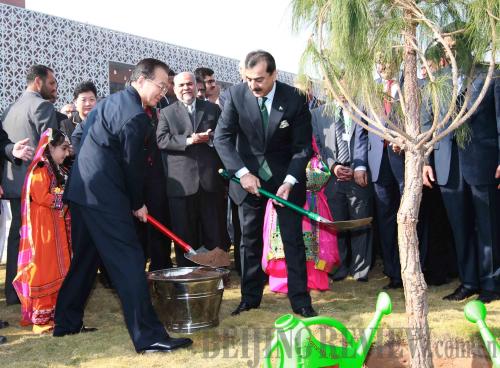|
 |
|
FRIENDSHIP TREE: Chinese Premier Wen Jiabao and his Pakistani counterpart Yousuf Raza Gilani plant a tree at the Pakistan-China Friendship Center in Islamabad on December 18 (LIU WEIBING) |
"China and Pakistan have laid a solid groundwork for cooperation, and their partnership will likely have a bright future," Ma, from the CICIR, said.
The two countries agreed to maintain regular mutual visits and contacts. They also decided to establish an annual meeting mechanism between state leaders and set up a foreign ministers' dialogue mechanism, in hopes of strengthening strategic consultation and coordination.
Economic cooperation also has great potential, Ma said. He said the two nations should consider enhancing cooperation in natural resources exploration, infrastructure construction, agriculture, power generation, mining and telecommunications.
Some of the 20 trade deals signed during Wen's visit concerned projects in new energy, agriculture and non-ferrous metal sectors.
The two sides also vowed to promote cooperation in clean and renewable energy. One major deal is aimed at developing wind and solar power, while another establishes a remote sensing satellite project between the Pakistan Space and Upper Atmosphere Research Commission and the China Great Wall Industry Corp.
Bilateral trade between the nations increased to $6.8 billion in 2009, up from $1 billion in 2000. During his visit, Wen said the China-Pakistan trade volume accounted for just 10 percent of Pakistan's overall foreign trade and he hoped the trade would soon top $10 billion. Two-way trade in first 10 months of 2010 matched the 2009 total and increased 27 percent over the same period last year.
China and Pakistan have maintained close cooperation in traditional security, but their cooperation in non-traditional security has increased in recent years, as global terrorism, separatism and extremism have increased. The forces are seen as serious threats to regional peace, stability and security, and the two countries reaffirmed their resolve to undertake substantive cooperation to jointly fight the three forces.
Premier Wen announced a planned aid package for reconstruction in flood-battered areas of Pakistan, saying China would continue to help Pakistan recover from the disaster and would provide resources and technical support for disaster prevention and forecasting.
The two sides decided to boost social and cultural exchanges as well, naming 2011 the Year of China-Pakistan Friendship. China plans to provide 500 government scholarships to Pakistani students in the next three years, and 100 Pakistani high school students will be invited to participate in a summer camp in China.
Sun from the CASS said the Sino-Pakistani relationship has endured long-term tests, and will not be influenced by changes in the international situation. Such a relationship is a good example of China's efforts to cement bonds with neighboring countries.
But one of Pakistan's most urgent tasks is to develop its economy. China, as a friendly neighbor, should offer more aid to Pakistan and play a larger role in Pakistan's economic development, said Sun. He suggested China invest more to help the country's infrastructure construction.
Both Sun and Ma said the continuation of stable relationships between China and its South Asian neighbors will not only create a peaceful development environment in the region, but will also help increase China's role on the world stage. China needs more policies to guarantee the smooth development of relations with its neighbors, Sun said.
As for the disputes between India and Pakistan, Ma has hope that the two sides will be able to solve their problems peacefully. "China would be pleased to see its two neighbors settle their disputes through negotiation, which will benefit both of them," he said. | 